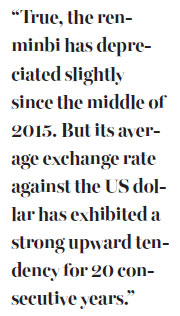Renminbi can stave off currency attacks
Updated: 2016-02-05 08:06
By Mei Xinyu(China Daily Europe)
|
|||||||||
China's industrial upgrading is continuing, and emerging advanced manufacturing is beginning to gain an upper hand
Billionaire hedge fund manager George Soros made news at the World Economic Forum in Davos. This year, he declared an "open currency war", saying he was short selling Asian currencies, including the renminbi. Due to his financial influence, his short selling remarks have added to the already volatile international financial market and increased the pressure from speculative attacks on the Asian currency market.
Soros is unlikely to achieve victory in challenging the Chinese renminbi. Despite its economic downturn since last year and its volatile stock market, as well as the renminbi's depreciation against the US dollar, China is still among the countries that boast good economic fundamentals at a time when the global economy as a whole is suffering. The 6.9 percent economic growth China registered in 2015 was two times that of the United States. In 2015, China's exports declined by 1.8 percent, while global trade fell by 10 percent.
China's industrial upgrading is continuing, and its emerging advanced manufacturing is beginning to gain an upper hand in an increasing number of areas. China still enjoys far better macro economic stability than a majority of other countries, including the other members of BRICS (Brazil, Russia, India and South Africa).

The better economic shape China is now in compared with other countries means there is no possibility for pure economic shocks to upset it. True, the renminbi has depreciated slightly since the middle of 2015. But its average exchange rate against the US dollar has exhibited a strong upward tendency for 20 consecutive years.
After such considerable appreciation, it is natural for the renminbi to depreciate moderately. China is now the world's second-largest economy and it is unlikely the country will permanently peg the renminbi to the US dollar.
To maintain an independent monetary policy in a world with a high degree of capital liquidity, China is willing to see a moderate exchange rate fluctuation of the renminbi. Investors will surely realize this trend sooner or later and reduce excessive reaction to it as in the previous months.
From a long-term perspective, the US dollar may maintain a strong momentum against emerging countries' currencies for quite a longtime, but it will be difficult to do the same against the renminbi. China now maintains a continuous trade surplus and it continues to expand. The US economy is deeply mired in a disease of the apparent causal relationship between the increase in the economic development of a specific sector and a decline in other sectors, and its "re-industrialization" campaign as part of its plan to reconsolidate its real economic foundation will be difficult to maintain.

Instead, the balance of its trade in goods is worsening despite its economic recovery. From 2011 to 2013, the growth of US' exports was faster than that of its imports, which to some extent improved its trade in goods balance. But starting from 2014, the trend reversed, as its export growth again exceeded its import growth, and the gap has continued to widen. Experiences from several dollar crises since the 1960s indicate that an ever-worsening trade balance and current account and fiscal deficit will cripple market confidence in the dollar. The latest round of a strong dollar against the renminbi will be interrupted by the Triffin Dilemma (where by the US needs to run balance of payments deficits that undermine confidence in the dollar as a reserve asset) and this is expected to occur sooner rather than later.
From another perspective, the war declared by Soros on Asian currencies will offer an opportunity for China to deepen financial and fiscal cooperation with other East Asian countries, and cooperation on the China-led Belt and Road Initiative. Currently, East Asian currency cooperation basically stays at currency swaps or other forms of low-level cooperation.
In the context of drastic currency market fluctuations in emerging markets and Soros' open hint of a speculative attack against them, it is expected that China and other emerging Asian economies will strengthen their financial cooperation, such as coordination and cooperation on monetary, financial and fiscal policies.
The author is are searcher at the Ministry of Commerce's International Trade and Economic Cooperation Institute. The views do not necessarily reflect those of China Daily.
Today's Top News
Inspectors to cover all of military
Britons embrace 'Super Thursday' elections
Campaign spreads Chinese cooking in the UK
Trump to aim all guns at Hillary Clinton
Labour set to take London after bitter campaign
Labour candidate favourite for London mayor
Fossil footprints bring dinosaurs to life
Buffett optimistic on China's economic transition
Hot Topics
Lunar probe , China growth forecasts, Emission rules get tougher, China seen through 'colored lens', International board,
Editor's Picks

|

|

|

|

|

|







